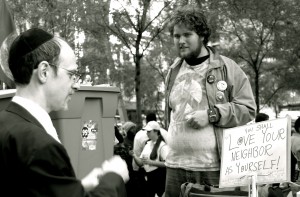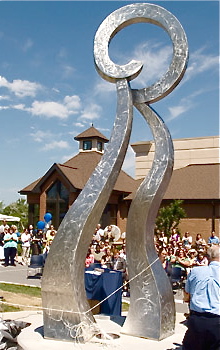together
It was July 19, 2013, and we were leaving New York City for a spiritual retreat, six days after a Florida jury found George Zimmerman “not guilty” in the death of Trayvon Martin. The sadness, anger, and weariness was well worn on the liturgies, prayers, and preaching of many of the churches in our Harlem neighborhood.
We found ourselves joining local church leaders and a few pastors in a conversation about justice that would eventually make its way toward a broad range of matters: the gay rights of questioning teens, clean water for children in Africa, and many of the frequent places conversations go with folks who are concerned with “loving our neighbor.” And so we sat, we listened, and were genuinely moved to openly share about the challenges and opportunities that have come with cultivating safe spaces for GBLT folks in our church community. TOGETHER we also inspired one another as we offered our collective experiences with integrating the arts in fundraising for international relief efforts.
And as Jose and I sat, listened, and shared TOGETHER, we found ourselves with heavy hearts waiting …“Would the conversation broach the tragedy of Trayvon Martin?” It didn’t.
And as we sat TOGETHER in sacred solidarity with compassionate, justice-minded pastors, who happened to be white, somehow we found ourselves feeling quite alone. So we mustered the courage to ask, “How have your churches responded to the Trayvon Martin verdict?” My question was met with silence. The silence that met us did not betray aloof or timid spirits, but rather uncertainty about whether their one voice could really make a difference, or that somehow they did not have the right to “speak on behalf” of brown and black realities.
I am waiting for the music to return — the sonorous graces of laughter and kitchen clinking, of bird call on the hillside.
I am waiting for the music to return — the precarious arrangement of hope and memory that uplifts and guides.
I am waiting for the music to return — the band, the orchestra, the seisiún, the jam, the people who make and craft sound.
Instead, I am stranded in an eschatological posture like pause on my mp3 player. The Wifi Spirit does not respond and even if I could connect, the playlist I have randomized is sore lacking. I miss the people who make these sounds. I miss their voices.
This morning at breakfast, I was reading an article in the newspaper about how the Affordable Care Act is negatively affecting some individuals — especially those who buy their own insurance, rather than receiving it through an employer. The article was interesting, but what struck me the most was the way the problem was framed. Rather than approaching the story from a public policy angle, the article mainly focused on the reaction of consumers of health-care goods and services. The crux of the article was whether some individuals should be required to buy a product they might not want or need so that other individuals could have affordable access to health-care products they need desperately but might not be able to afford under the old regime.
The dilemma was presented as a story of tension between healthier consumers and less healthy consumers fighting to get the best deal for their health-care dollars. But could there be another way of thinking about health care, and about our society as a whole? Is there a framework that would allow us to consider these questions in a way that assumed connection, caring, and community between individuals, rather than the zero-sum competition of the market?
 We're in this thing together or we're not in this thing at all.
We're in this thing together or we're not in this thing at all.
We should all be marching in the streets.
We are the 100 percent.
We are poor. We are well-to-do. We are those somewhere in the middle. We are aware of the struggles and unfairness of this world and for this reason we are sensitive to one another's needs. So, we love our neighbors as ourselves.

Our moral strength as a society comes from how we treat vulnerable populations. The rise of programs such as Medicaid and Head Start has allowed the independent living movement among those with disabilities to flourish and groups such as Heritage Christian Services do their life-changing work
But here's the problem: Heritage Christian Services just saw their funding cut by the federal government and they are concerned that worst of the cuts are yet to come.


